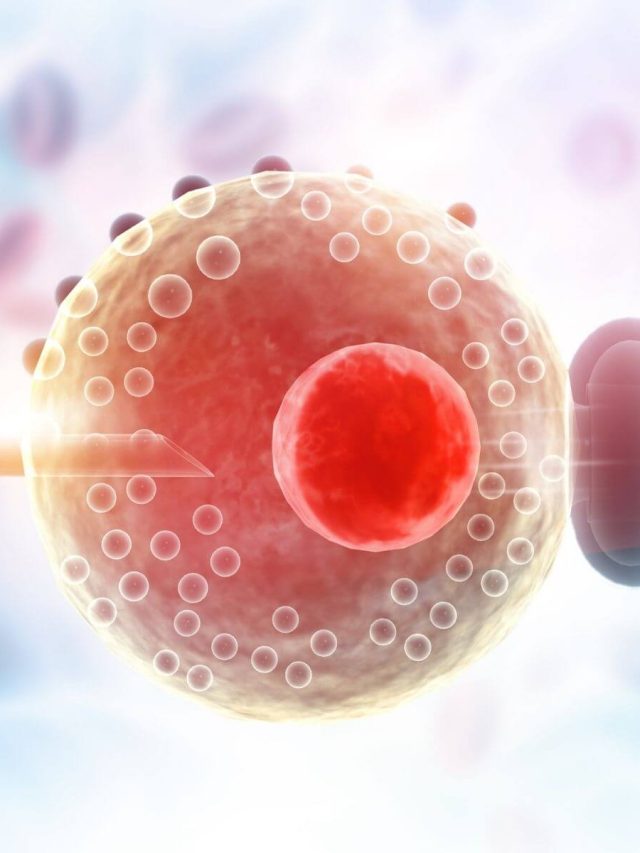Figuring out this whole “getting pregnant” thing can be a difficult task for many of us. Even though our 7th-grade sex education textbooks make it seem simple, a lot of us find ourselves asking questions, like “When does implantation occur?”
If you’re wondering whether implantation has happened or what implantation symptoms you should be looking for, you’re not alone.
Take me, for example.
After my embryo transfers, I performed mental body scans every few minutes to figure out whether I was “feeling” anything. It didn’t matter if it was an itchy foot or a runny nose; I found ways to call my sensations “implantation symptoms.”
If you want the 411 about what happens after conception, our team is here to help. We’re breaking down every aspect of the implantation journey and telling you what to expect when you think you might be expecting. Ready to learn more? Let’s go!

This site contains affiliate links, meaning that we earn a small commission for purchases made through our site. We only recommend products we personally use, love, or have thoroughly vetted.
- What is Implantation in Pregnancy?
- How many days after Ovulation does Implantation occur?
- How long does Implantation take after Embryo Transfer?
- How long after Conception does Implantation occur?
- How to use an Implantation Calculator
- When Does Implantation Occur: 5 most common symptoms
- Period vs. Implantation Bleeding: What Does Implantation Bleeding Look Like?
- What Day Does Implantation Occur 101: Try not to stress
What is Implantation in Pregnancy?
Let’s go back to those birds and the bees conversations we had as kids for a moment. You know, the one where the man pollinates the woman’s flower and all of that?
While we might have believed that all it took was a man spreading his “seed” to make a baby, the reality of the situation is that there’s more involved. Sure, when a man’s sperm enters a woman’s egg, they could have potentially conceived a child.
Without implantation, though, you won’t actually have a pregnancy.
In answering the question, when does implantation occur? It’s crucial first to understand what implantation is.
After conception occurs, the fertilized embryo will make its way down a woman’s fallopian tube. Once it reaches the end, it will burrow itself into the wall of her uterus.
Until this final step has taken place, a woman’s body will not start producing hormones and creating the placenta to help care for her little one throughout pregnancy.
Essentially, implantation is the crucial step when a fertilized embryo implants into the uterus. This allows your body to start preparing for pregnancy.
How many days after Ovulation does Implantation occur?
So, now that you know what implantation is, we can move on to the bigger question – when does implantation occur?
After spending so much time trying to find the best ways to track ovulation and calculate your fertile days, it can seem exhausting when you realize there’s one more thing you might need to time out.
Thankfully, there’s no rule stating you have to keep up with implantation timelines while you’re tracking your fertility.
Generally speaking, implantation normally happens 8 – 10 days after conception.
Keep in mind, though, that this isn’t an exact science. Your embryo can implant as early as six days after ovulation and late as twelve.
How long does Implantation take after Embryo Transfer?
Since approximately 1.9% of babies born each year are conceived using Assisted Reproductive Technologies (ART), you might be wondering if the same implantation timeline applies.
For hopeful parents who undergo embryo transfers to conceive, they can expect their little one to begin implanting two to five days after the transfer has taken place. Be aware, however, that just because implantation might happen quickly after an embryo transfer, it will still be around nine to fourteen days (hence the two week wait!) before you can receive accurate results.
In the case of women who use intrauterine insemination (IUI) to get pregnant, implantation occurs within the same time as natural conception.
How long after Conception does Implantation occur?
We’re all a bit impatient when it comes to figuring out how this process works; well, at least I know I am! The good news is that some thorough research can 100% replace everything you were “supposed” to learn in sex ed while you were too busy squirming due to what you–and everyone else in the class–perceived to be highly embarrassing information. In fact, the scientific process of implantation can be rather calculable.
Once you’ve enjoyed some good old birds and the bees acts with your significant other, the sperm meets the egg in the process of conception. Conception is when the sperm swims through the vagina and meets the egg in the fallopian tube. This is also known as fertilization, and while it’s an important part of the process, it’s not the only part!
So the egg and the sperm have met–now what? It’s easy to sort of gloss over the “sciencey” part of all this; I get it! When you’re trying to conceive (also known by the acronym “TTC”), you sort of want all the stuff on the cellular and physiological levels to, well, just work.
But implantation comes after conception, and implantation is just as important as conception! Implantation typically occurs around 6 to 12 days after conception. When the egg is fertilized (thank you, sperm), the fertilized egg (AKA an embryo) undergoes the process of “cleavage,” which is where it divides into multiple cells. Then it makes the journey from the fallopian tube toward the uterus.
Once the embryo reaches the uterus, it attaches and implants itself into your uterine lining as a blastocyst. It’s important to note that the blastocyst doesn’t always implant, though. Sometimes it can fail to implant into your uterine lining (also called the endometrium) and pass through your uterus during your menstrual period.
Ultimately, implantation is a very important part of the pregnancy process and occurs between 1-2 weeks after conception. It’s important to understand that not everyone is the same, though! Implantation can vary slightly from person to person, and some folks experience implantation earlier than the average time frame we’ve laid out here.
How to use an Implantation Calculator
Are you still feeling confused about when implantation occurs? Don’t worry! There are plenty of great online implantation calculators available to help you figure it out.

When Does Implantation Occur: 5 most common symptoms
In answering the question, “When does implantation occur?” it’s only natural the next query would be, “What implantation symptoms can I expect?”
While it will be too early for many of the unusual early pregnancy signs many people hear about, there are a few things you might notice as implantation is taking place:
- Mild Cramping: As the embryo attaches itself to the uterine lining, it can sometimes cause slight abdominal cramping.
- Light Bleeding: It’s not unusual for women to experience light spotting when implantation takes place.
- Tiredness: Do you suddenly feel like you could use an afternoon nap? This could indicate something’s happening inside your uterus.
- Tender Breasts: Occasionally, implantation can cause your breasts to become a little sore.
- Headaches: As implantation occurs and your body starts to produce all of those delightful pregnancy hormones, you could start getting headaches.
Period vs. Implantation Bleeding: What Does Implantation Bleeding Look Like?
Since one of the most common implantation symptoms is light bleeding, some women often wonder how they’re supposed to tell the difference between being pregnant and having their period.
A few key features can help you determine whether you’re dealing with a period or implantation bleeding.
- While implantation bleeding usually only lasts 1 – 3 days, a period often goes for 4 – 7 days.
- Implantation bleeding doesn’t usually have clots or tissue that can be common with periods.
- You might notice that period blood usually turns bright red once it starts. Implantation bleeding, however, remains brown or pink.
- Implantation bleeding never exceeds light spotting and can sometimes come and go.
Unfortunately, the only concrete way to tell is to make an appointment with your doctor or wait for your post-embryo transfer pregnancy test.
What Day Does Implantation Occur 101: Try not to stress
Are you ready for the number one rule when it comes to answering the question, “When does implantation occur?”
Try stress about it! (Trust us, we know this is easier said than done!)
While it’s easy to obsess over whether you’re pregnant or not, getting worked up about whether implantation has happened or not will only cause undue stress.
Be kind to your mental and physical wellness and wait patiently for the moment when you take a one-week pregnancy test or make an appointment with your doctor.
Obsessing over implantation symptoms and using an implantation calculator thirty times a day won’t change whether you’re pregnant or not. Whatever happens, happens, so take it easy and try to reduce your worry about what’s happening inside your body.
Have you ever felt stressed out wondering when does implantation occur?











